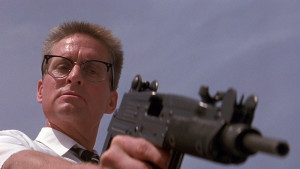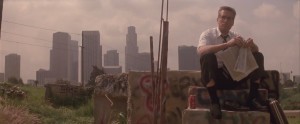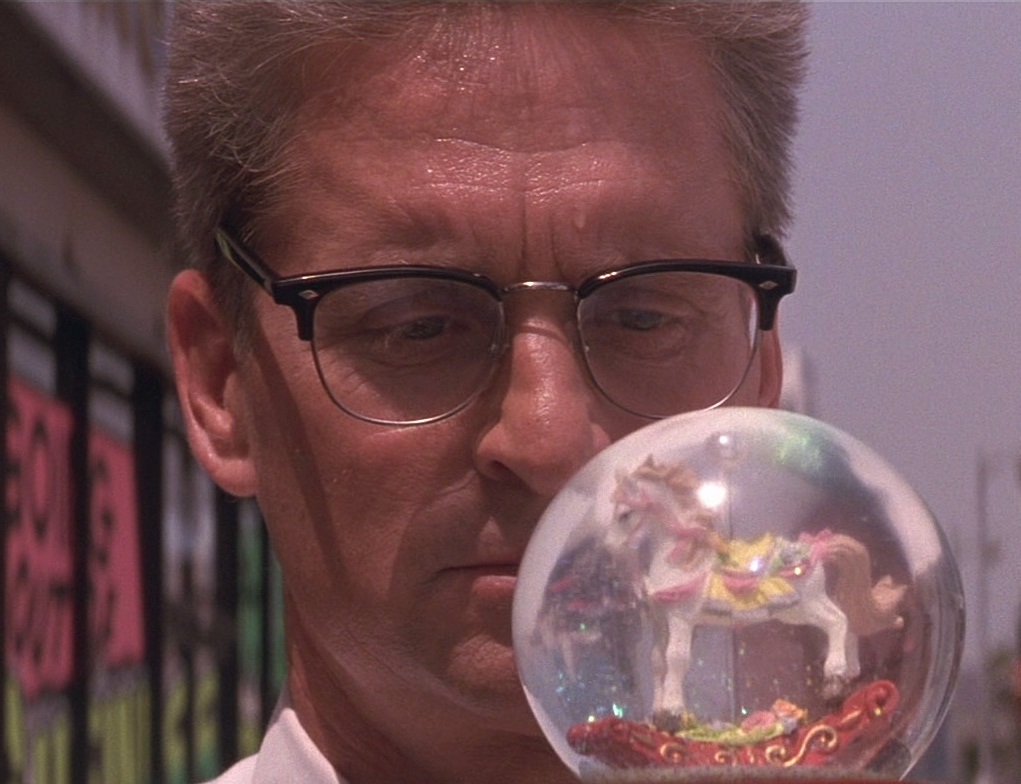Let’s face it; all of us, at one point in time or another, have wanted to snap. Stress from the nightly news, family, work, relationships (or lack thereof) can render us frustrated, and each of us has experienced anger to a near boiling point. While most of us are able to curtail these violent primal urges, the 1993 Joel Schumacher film “Falling Down” deals with one such situation where a seemingly ordinary individual succumbs to the pressures and doldrums of life and crosses the point of no return.
In a cinematic rarity, the central character in the story is also the film’s antagonist. Primarily set out through the perspective of common man Bill Foster as he embarks on a violent rampage across the city of Los Angeles. The entire story is told over the course of a single day and adds to the dynamic as we follow the action from an early morning commute through the high noon and the setting sun in the evening. From the fantastic opening sequence, Schumacher puts you directly into the mindset of a madman.
It’s a muggy and sweltering summer morning and a logjam of cars sit bumper to bumper amidst Los Angeles’ notorious labyrinth of congested freeways. In an extremely relatable scenario, we feel the pain of Foster (Michael Douglas) as he gradually begins to boil and begin the trip to the snapping of sanity. Quick and repetitive cut shots show us Foster’s world at that moment in time; a stuffy car, an annoying fly, screaming kids, motionless traffic, horns blaring…Foster abruptly abandons his car in the middle of the highway and announces to the furious driver behind him that he’s “going home.”
In the same traffic jam is Detective Prendergast (Robert Duvall) on his way to the precinct for what will be his last day of work before retirement. Prendergast takes note of Foster’s customized license plate ‘D-FENS’ and laughs it off. On foot, the seemingly benign Foster enters a convenient store and politely asks the Korean owner Mr. Lee (Michael Paul Chan) to change a dollar so he can make a phone call. Though the cash drawer is clearly open, Lee refuses to break the dollar unless he makes a purchase. Foster grabs a can of Coke and holds it to his head to cool off (literally and figuratively).

The viewer can feel the heat and humidity embracing Los Angeles, and the tension and fury embracing Foster. Back at the counter, Foster begins to haggle with Lee over the price of the soda – at .85 cents if he buys it he won’t have enough change for the phone. Foster also derogatorily mocks Lee’s accent. After a few moments, Lee attempts to eject him from the store. “You go now. No trouble.” Foster, growing angrier by the minute, slams his briefcase down on the counter. “I stay! Whattdya think about that?” Lee pulls a baseball bat and a scuffle ensues. Foster quickly procures the bat and begins “rolling back prices” by demolishing the store’s merchandise. A cowering Lee begs him to take his money and leave. Shocked at the suggestion, Foster calls Lee the thief due to overcharging, pays for his soda (taking a quarter for the phone which was all he asked for in the first place) and leaves with the bat, thus beginning his journey to the boundaries of sensibility.
Prendergast and his partner Sandra (Rachel Ticotin) unknowingly get involved in the pursuit of Foster, who is now crossing Los Angeles, and acquiring weapons along the way. Foster reveals his intentions are to reach the house of his ex-wife Beth (Barbara Hershey) and the couple’s daughter Adele as today is her sixth birthday. “I’m going home! Clear a path!” Foster yells menacingly in the midst of his mayhem.
 On its surface, “Falling Down” is a simplistic movie. But film analysts will enjoy its deeper rooted and symbolic nature. The character portrayed by Michael Douglas is clearly an antagonist but one who is quite sympathetic for almost everyone watching. Douglas plays the role brilliantly; a perfect nerd with Dilbert style glasses, crew cut, short-sleeved shirt with necktie – the viewer roots for him until he “falls down” and crosses the point of no return.
On its surface, “Falling Down” is a simplistic movie. But film analysts will enjoy its deeper rooted and symbolic nature. The character portrayed by Michael Douglas is clearly an antagonist but one who is quite sympathetic for almost everyone watching. Douglas plays the role brilliantly; a perfect nerd with Dilbert style glasses, crew cut, short-sleeved shirt with necktie – the viewer roots for him until he “falls down” and crosses the point of no return.
Douglas exudes the character’s fury, and his own discomfort at self-inflicted errors that ruined his life. Schumacher has directed dozens of fantastic movies, and this may be his best work. The movie could only take place in Los Angeles – with soggy heat and the menacing skyline in the backdrop, various cultures mixed together – you feel like you are walking along with Foster on his journey. At one point, in a near childlike manner he questions his actions with “I’m the bad guy?”
Though extremely violent, “Falling Down” also contains numerous comical and laugh out loud moments and scenes. The movie also cements Robert Duvall as one of my favorite actors. His subtle nature carries the warmth and power of Prendergrast – not a fat free chiseled model like Jason Staham or Channing Tatum – but a portly detective turned desk jockey, tasked with cracking a highly dangerous case on his last day of work.
“Falling Down” is a must have for every collection.
– by Matt Christopher


